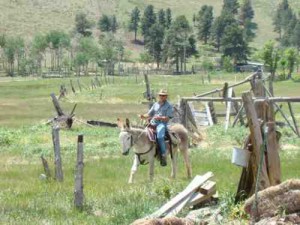Brief by Allen Best
Economy – January 2009 – Colorado Central Magazine
The Yellowstone Club, founded in 1999, soon became a metaphor for high-end exclusivity in the mountain valleys of the West. The ski trails were immaculate and private. Homes cost up to $20 million. Members and their guests flew into nearby Bozeman, about an hour away, on private jets.
Now, in the wake of the club’s bankruptcy filing in November, the Yellowstone Club is becoming a different metaphor, observes the New York Times, proving that even big gates can’t keep out broader economic forces.
“The sense of refuge was an illusion,” says the newspaper’s Kirk Johnson. “The global financial crises have stormed even these gilded confines.”
Johnson describes the Yellowstone Club as a “cloistered and cosseted mountain retreat,” words similar to those he used to describe Aspen several years ago. But while Aspen has plenty of billionaires, Yellowstone has Bill and Melinda Gates and a passel of others with pockets deep enough for just a few hundred people to have their own private preserve of 13,500 acres of hitherto pristine land.
But the causes of the Yellowstone Club’s bankruptcy are more complex than just a battering economy. There’s also the divorce of Yellowstone Club founder Tim Blixseth, and his wife, Edna. She gained control of the club, then filed for Chapter 11 bankruptcy protection, citing the club’s inability to restructure $399 million in debt.
A loan of $20 million will keep the club running until next April. A bankruptcy court in Montana chose a plan by Sam Byrne’s Boston-based hedge fund, CrossHarbor Capital Partners. Credit Suisse, with a greater stake in the resort, $311 million, had wanted the club closed and its assets sold off as quickly as possible.
Laura Bell, the editor of the Big Sky Weekly, said that Tim Blixseth tried to do too much too soon. Then, the Blixseths were sued by former Tour de France champion Greg LeMond, who claimed to have been wronged. Earlier in the year, the lawsuit was settled in his favor.
People who buy into the Yellowstone Club were promised privacy, says Bell, and believed they were getting it. Now, that privacy has been compromised. “The owners’ dirty laundry is getting aired, and they are not happy about it,” Bell told Mountain Town News.
The Times wondered how locals in nearby Bozeman, located an hour away, had reacted to the bankruptcy. Comments revealed ambivalence. “It’s pretty grotesque and ridiculous, but at the same time, a lot of people depend on going up there for jobs,” said Greg Thomas, a 31-year-old construction worker.
Bill Hopkins, who is 51 and works in Yellowstone National Park, said he can “kind of gloat on one hand, but I’m not really happy about it.” The land is developed, and so the resort should at least be operational, he explained.


